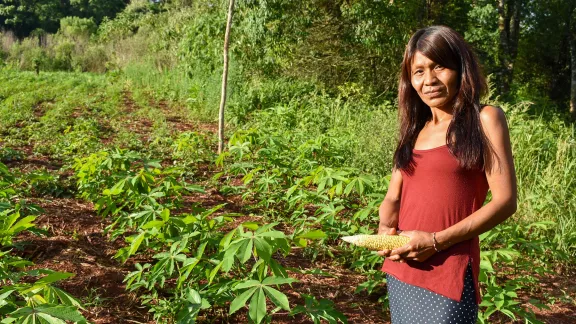
A Mbya Guaranà farmer in Kaâa Kupe community, Misiones province. All photos: Hora de Obrar
Human rights, food security and environmental protection among indigenous Mbya Guaraní
(LWI) – From its beginnings as a department for diakonia in the Evangelical Church of the River Plate (IERP) through its recognition as an outspoken advocate for the rights of indigenous communities in Argentina and Paraguay, one factor has remained constant for the Hora de Obrar Foundation: unwavering support from several partners including The Lutheran World Federation (LWF).
When Hora de Obrar (Time to Act) recently announced it was among four organizations out of 90 whose proposals had been approved for funding by the European Union, its director Nicolás Rosenthal expressed “deep gratitude to the LWF for all these years of support and trust.”
The foundation responded to the government’s call for project proposals that would meet funding criteria from the European Instrument for Democracy and Human Rights, particularly focused on the situation of indigenous people. Bread for the World, the development and relief agency of German Protestant churches was the lead partner applicant for the EUR 880,000 fund for which Hora de Obrar will be the local implementing partner over a period of three years.
The new grant will help the IERP foundation to extend its work beyond the current four Mbya Guaraní communities to 15 in the Ruiz de Montoya municipality in the northeastern province of Misiones. “We are happy that we will have funds to expand the sectors of food security and health, and add gender justice, education, safe infrastructure and sustainable economic development, in a process of permanent consultation with the communities,” said Rosenthal.
Project support is part of LWF communion relations
As one of LWF’s member churches, IERP relates to the LWF through many activities that help to build the capacity of the church, and strengthen relations between the member churches at regional and global levels. LWF has been funding part of Hora de Obrar’s work among the Mbya population through the communion’s Member Church Projects’ portfolio since 2004, with a total financial contribution of over EUR 600,000. Funding to the current project commenced in 2013 and will total EUR 169,000 by the time it comes to an end this year.
The joint work with LWF allowed us to develop our capacities and build experience that enabled us to take this new step. We are deeply thankful, and are convinced that LWF is a huge part of this achievement,
"The joint work with LWF allowed us to develop our capacities and build experience that enabled us to take this new step. We are deeply thankful, and are convinced that LWF is a huge part of this achievement," added Fabián Dinamarca, Hora de Obrar project coordinator.
Ms Rebekka Meissner, LWF project executive for Member Church Projects said it was important to emphasize that the end of a project cycle does not mean the end of collaboration with the LWF. “I hope that other project holders will be able to benefit in the future from the substantial expertise and experience that Hora de Obrar brings to the table. Mutual inspiration and learning are key.”
Food security
One of the foundation’s activities is securing farming land for indigenous people in a country where the growth of the corporate agricultural industry over the last 20 years encroaches on indigenous forest and land reserves inhabited by the Mbya people. Their livelihood practices such as the preservation of indigenous trees, hunting, and picking of nuts, fruits and other foods are threatened. Hora de Obrar’s efforts to increase food security include clearing land and providing skills to cultivate maize, beans, plantains, vegetables and fruits. Reforestation is also prioritized, and a campaign that was started in 2020 aims at planting 180,000 native trees throughout the province to ensure sustainability of the ecosystem.
In Ka’a Kupe community, where Hora de Obrar has been supporting 15 families to improve their annual food production, some have created their own vegetable gardens from cabbage, tomato, lettuce, onions, carrots and parsley seedlings. The foundation also provides a few tools such as hoes and watering cans.
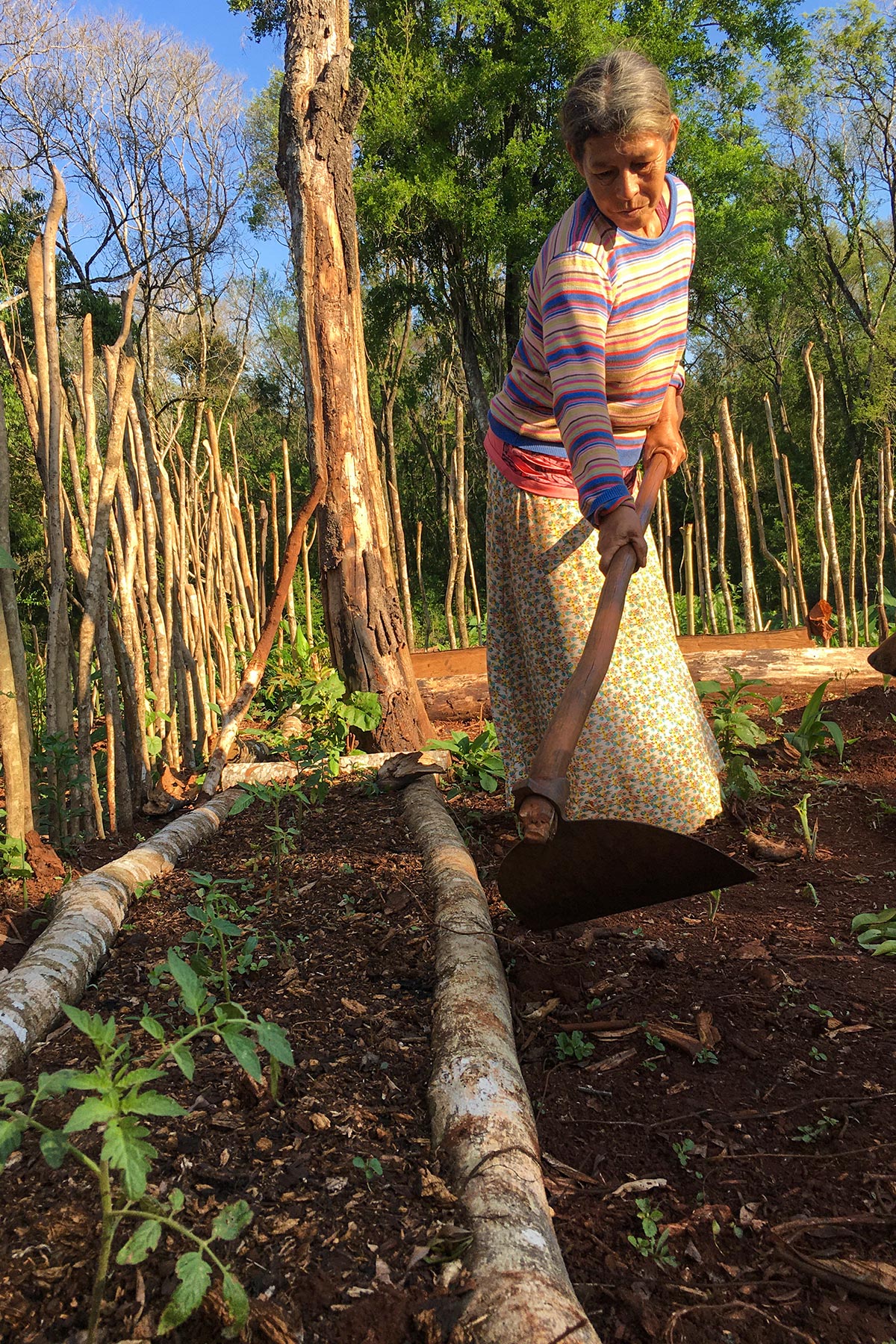
A farmer tills her vegetable garden.
Bilingual school
IERP’s work in the 1960s included congregation-based schools and institutional homes as a response to social demands that the state could not meet. The exchange and mutual training between the Mbya communities of Paraguay and Misiones around the axes of education, organizational strengthening and health care is a critical part of the foundation’s work.
Today, one of the education initiatives is the bilingual (Mbya Guaraní and Spanish) and intercultural Takuapí School, which belongs to the local congregation and is supported by Hora de Obrar. The curriculum of the primary-age school integrates the common contents that are part of Argentina’s education system, and indigenous knowledge and language to preserve the Mbya culture.
Financed by the Argentine government, income from the sale of crafts, support from the local congregation and donations from its partners abroad, the school has 76 students and a staff of 10. It also offers workshops in cookery, arts and crafts, and runs a soup kitchen, which was especially important during the COVID-19 pandemic.
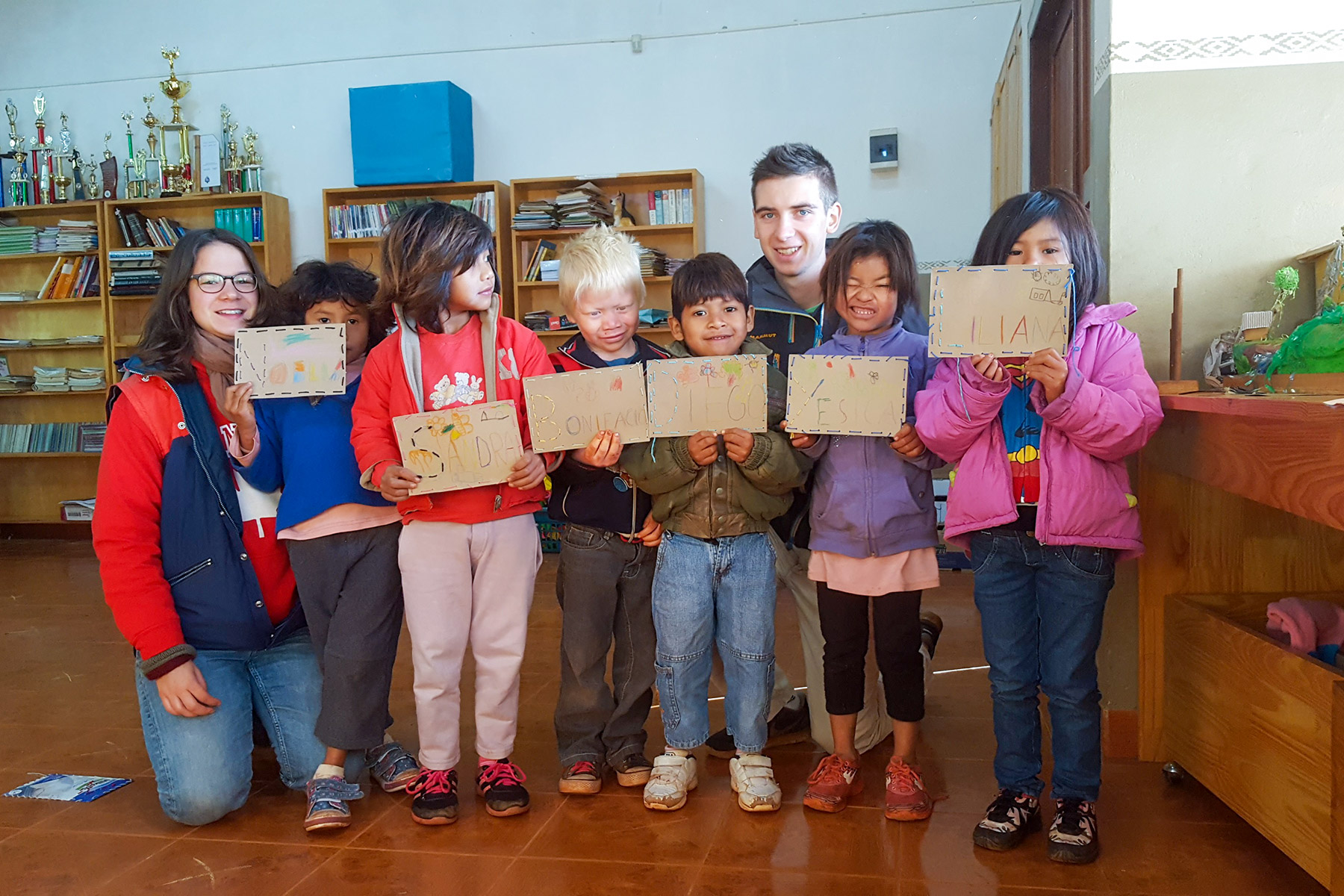
Volunteers Annika Hilkert and Magnus Böck from Germany, with a group of children enrolled at the Takuapí bi-lingual school.
Gender justice
The IERP diaconal body collaborates with other civil society and government actors to raise awareness about gender justice including violence against women. Through different platforms, indigenous women access information about their rights in their local language, and direct follow-up is provided. This has also exposed other concerns, including provision of medical care and psychosocial support for people suffering from substance use and mental health.
Economic, social and cultural rights
At the center of Hora de Obrar’s work is advocating for the rights of indigenous people. The April 2020 Inter-American Court of Human Rights ruling that the Argentine State has an obligation to protect the economic, social and cultural rights of indigenous communities in the northwestern province of Salta was particularly significant. Raising awareness about this first international ruling on territories for native peoples in the country remains a priority for the IERP foundation.
Aware that the new EU-sourced funding like LWF’s long-standing support has a time limit, Rosenthal emphasized the need for partnerships that guarantee the communities’ sustainability. “That is why the entire project aims to leave a legacy of well-established human and material capacity that will strengthen ties with state and private actors,” he added.
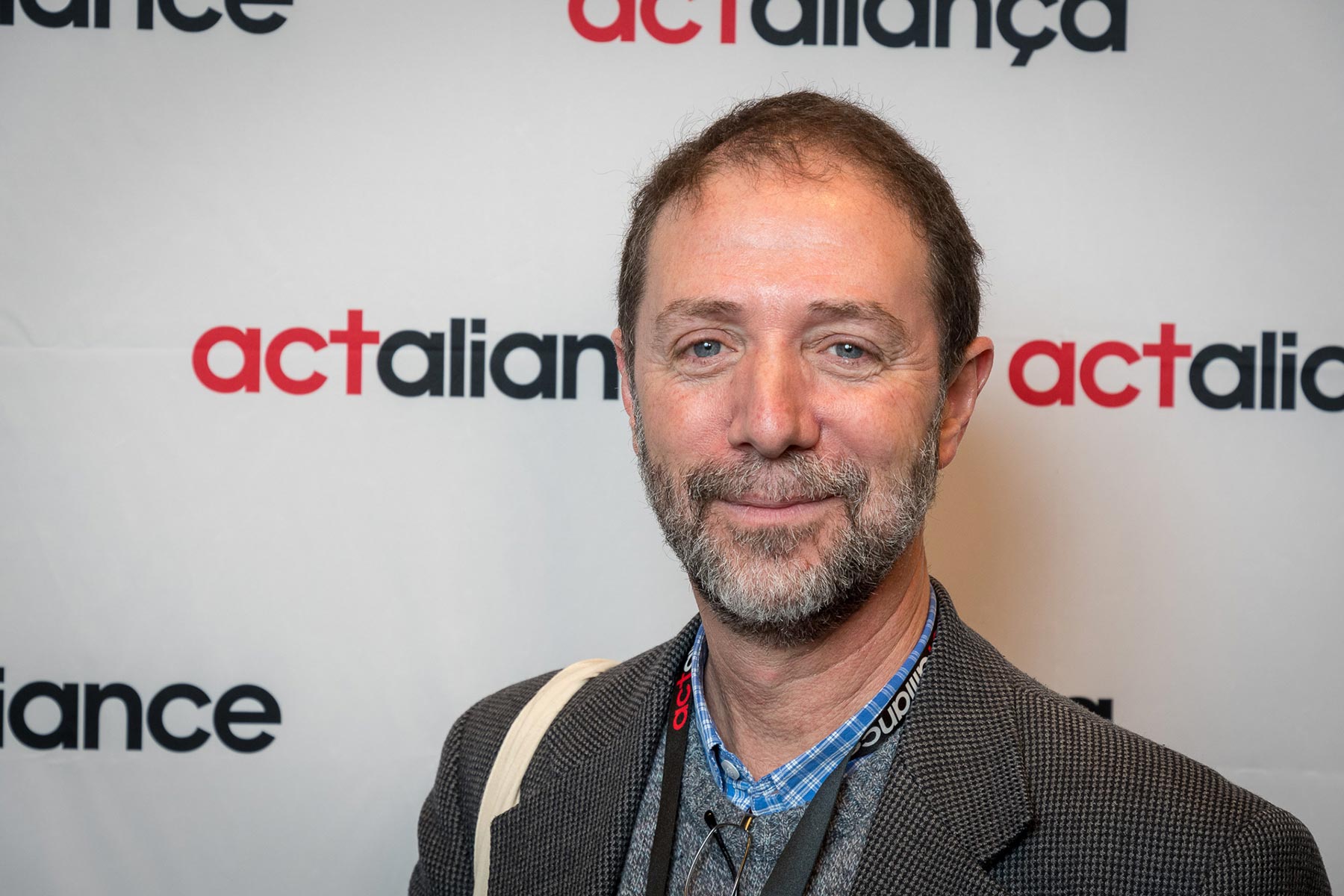
Mr Nicolás Rosenthal, director, Hora de Obrar Foundation.
Due to the COVID-19 pandemic restrictions, the foundation has had to reduce or adapt some of its activities, but always ensuring that indigenous communities are not subjected to further risks. Such intervention in 2020 included the distribution of food and hygiene kits to isolated indigenous communities in Misiones through funding from the LWF Rapid Response in 2020.
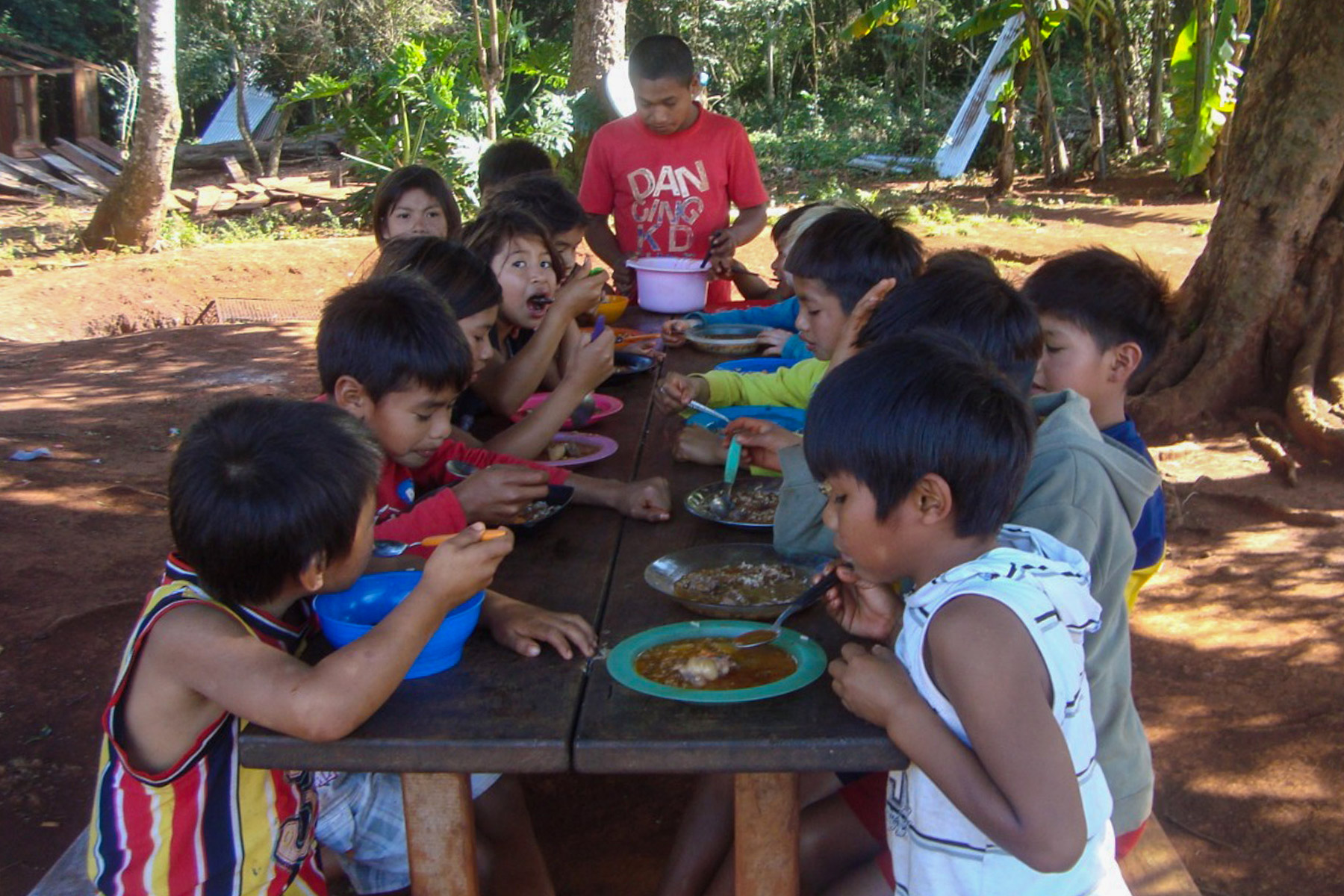
The Takuapí school soup kitchen has been especially essential during the COVID-19 pandemic.
The Evangelical Church of the River Plate (IERP) has congregations in Argentina, Paraguay and Uruguay. It has 27,000 members and it joined the LWF in 1991. IERP President Rev. Leonardo Schindler is the head of the church.
Through its Member Church Projects’ portfolio, the LWF supports churches in their efforts to provide hands-on solutions to address pressing needs in their congregations and wider community. Projects are diverse, ranging from theological training to health, livelihood initiatives to women’s and youth empowerment. The aim is always to support what matters most to churches and to improve their ability to plan, monitor, implement and report on the outcome of projects. Both funding partners and implementing partners are usually LWF member churches or related to the communion.


